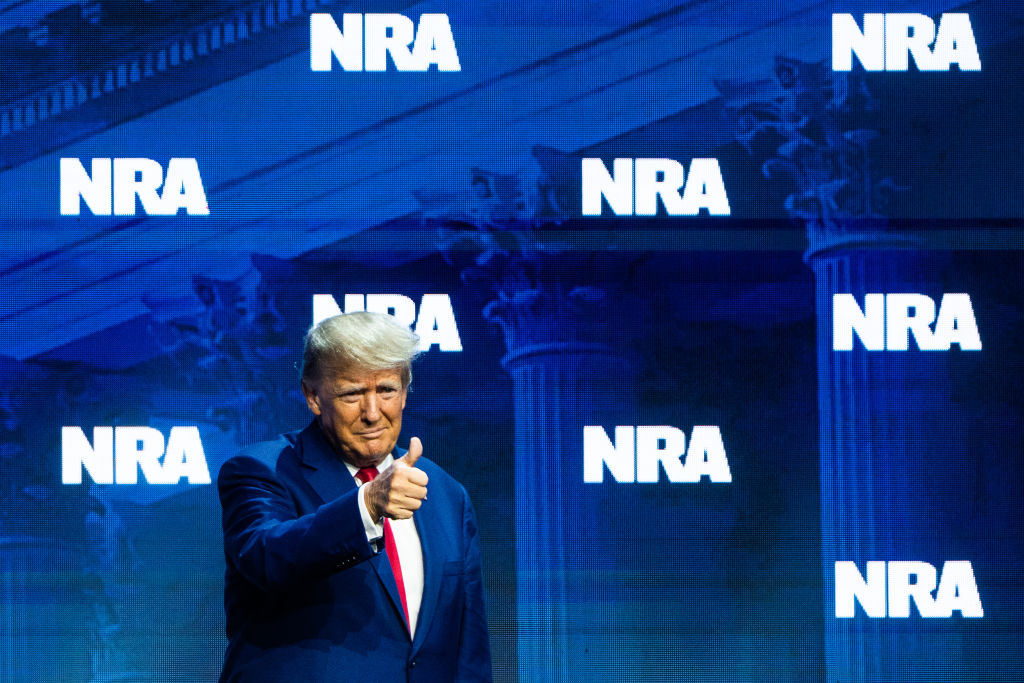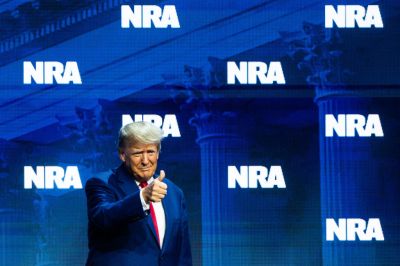As presumptive Republican presidential nominee Donald Trump sits in a Manhattan courtroom facing one of the several criminal trials that could permanently strip him of his ability to own firearms (he already can’t acquire new guns while under felony indictment), the gun rights movement faces an unstable and under-discussed precipice: Its national fortunes are tightly entwined with those of an unpopular politician who has threatened to cross them before and just got done crossing similarly situated pro-life activists.
Gun owners haven’t been on shakier ground in years, and their marquee organization—the National Rifle Association—is poorly positioned to steady things this time around.
That shouldn’t necessarily be the case, given some recent trends in American gun ownership. We’re just a few years removed from the greatest run on firearms in history. Industry estimates indicate more than 13.8 million Americans bought their first gun during the COVID pandemic. A 2023 NBC News poll found 52 percent of American voters now say they have a gun in the home, up 10 points in 10 years. A slew of surveys have found those new firearms owners are concentrated among demographics that traditionally buy guns at a lower rate, namely minorities and women.
Additionally, nearly a majority of Americans who don’t own a gun told Gallup in 2023 they are open to the idea.
None of these trends have resulted in a realignment among Democrats who, if anything, are more hostile to the gun rights movement than they were five, 10, or 15 years ago. President Joe Biden has enacted a series of broad, unilateral gun restrictions through ATF rulemaking and made a ban on sales of the nation’s most popular rifle his top legislative priority, and is running to the left of any other presidential nominee on guns since Bill Clinton.
Regardless of whether Democrats modulate their positions on guns, the recent trends should offer fertile ground for recruitment to gun rights activists, especially by the NRA. But that hasn’t happened. That’s primarily because as gun ownership surged, the NRA became embroiled in a drawn-out corruption scandal that still hasn’t ended.
The year before COVID pushed millions of Americans into their local gun stores, accusations of self-dealing and lavish personal spending funded by donor dollars pushed millions away from the NRA. While longtime NRA leader Wayne LaPierre—who was recently found by a jury to have taken millions from the group—has retired, the group’s future remains in limbo as the civil case against it continues. But the ordeal has already left the NRA’s finances in shambles, and its political operation is currently being outraised and outspent by gun-control groups. Meanwhile, no other gun rights group has supplanted the NRA.
This decline might explain why gun rights activists seem to have lost power even among Republicans, who were indifferent to their votes during the presidential primary.
As much as the Republican primary was filled with pulled punches from Trump’s opponents, they at least occasionally tried to draw a policy contrast with the former president. Former Vice President Mike Pence and Florida Gov. Ron DeSantis attacked Trump for being insufficiently committed to the pro-life cause on several occasions.
No one did the same for his commitment to the pro-gun cause, which was perplexing since the Trump administration’s accomplishments on guns are actually very similar to its pro-life accomplishments. Trump didn’t usher in much legislative change, but—as they did with the Dobbs case overturning abortion protections—his Supreme Court appointments delivered a ruling long sought by gun rights advocates: the expansion of recognized Second Amendment protections in New York State Rifle and Pistol Association v. Bruen.
Trump’s pro-gun bonafides beyond Supreme Court appointments are probably more mixed than his pro-life ones, which should have opened him up for criticism from his Republican challengers. Though he signed a bill rolling back an Obama-era restrictions and established gun manufacturers as essential businesses during the pandemic, he also unilaterally imposed the bump stock ban using ATF rulemaking to bypass Congress (which is currently being challenged as unconstitutional at the Supreme Court).
Trump even defended that ban in the middle of the primary, eliciting only crickets from his opponents and top gun rights activists alike.
“As you know, the bump stocks are actually a very unimportant thing,” Trump said during a CNN town hall in May 2023. “NRA I went with them, and they said, ‘It doesn’t mean anything, or actually all they do is teach you how to shoot very inaccurately.’ So, we did that.”
Trump also suggested enacting more gun restrictions during his first term. In the wake of the February 2018 shooting at Marjory Stoneman Douglas High School in Parkland, Florida, he held a meeting with lawmakers of both parties in the White House where he attacked his fellow Republicans as beholden to the NRA and expressed interest in pursuing so-called red flag laws and other gun-control proposals.
During that meeting, Pence said such measures can “give families and give local law enforcement additional tools if an individual is reported to be a potential danger to themselves or others.”
“Allow due process so no one’s rights are trampled,” Pence said. “The ability to go to court, obtain an order, and then collect not only the firearms but any weapons in the possession of that individual … ”
“Or, Mike, take the firearms first and then go to court,” Trump interrupted. “Because, a lot of times, by the time you go to court, it takes so long to go to court, to get the due process procedures—I like taking the guns early. Like in this crazy man’s case, that just took place in Florida, he had a lot of firearms, they saw everything—to go to court would have taken a long time, so you could do exactly what you’re saying, but take the guns first, go through due process second.”
Similarly, the New York Times has reported Trump considered supporting a ban on AR-15s and other guns in the wake of the 2019 El Paso shooting. “What are we going to do about assault rifles?” Trump asked, according to the paper.
Trump eventually abandoned both ideas, multiple sources with knowledge of the discussions told me, at least in part because of conversations he had with NRA officials. Trump has put a lot of weight in what the NRA has to say since it was one of the few major groups to enthusiastically back his unexpectedly successful 2016 campaign. The group spent nearly $20 million running ads against Hillary Clinton, more than $11 million boosting Trump, and $54 million overall that year.
But the NRA isn’t in a position to muster anything close to that sum in 2024.
Polling also suggests the pro-life movement and gun rights movement each have some similar and significant vulnerabilities. Americans consistently say they want stricter gun laws and oppose abortion bans. Each movement is also on the wrong side of some specific policy questions, with Gallup finding 84 percent of Americans want abortion legal in all or some cases and Fox News finding 87 percent want universal background checks.
Trump has taken a variety of positions on both issues over the years, too. He was much more liberal on guns and abortion before entering politics in earnest. Since then, he’s tried to triangulate a position he seems to think is most politically advantageous.
Still, there are several reasons to think Trump won’t go against gun voters the way he has with pro-lifers.
Personal factors might partially distinguish the two issues in Trump’s mind. He has owned and carried guns. His sons are even more interested in hunting and gun rights than he is, and it’s not clear anyone in his family has the same personal connection to the pro-life movement that Donald Trump Jr. and Eric Trump have to the gun rights movement.
But the two issues’ political volatility (or lack thereof) probably has more to do with where Trump is headed for now. Gun rights activists haven’t seen the series of defeats in ballot initiatives that pro-lifers have. Instead, red states have predictably passed pro-gun bills, while blue states have reliably passed new restrictions.
The landmark Supreme Court cases themselves have also seen a stark divergence in approval. While just 33 percent of Americans approve of the Dobbs case overturning Roe in the latest Marquette Law School poll, 64 percent approve of Bruen.
Additionally, Trump spent quite a while telegraphing his abortion pullback. He hasn’t done the same with guns. In fact, just a few months ago at the NRA’s Great American Outdoor Show in Harrisburg, Pennsylvania, he made a series of policy promises and presented a stark contrast between himself and President Biden on the issue.
“Joe Biden and his thugs will do everything in their power to confiscate your guns and annihilate your God-given right to self-defense,” he said. “A meaningful Second Amendment, which you have, it’s under siege. They got nowhere with me, but there are a lot of other things happening with Biden.”
Of course, even if Trump does stay true to the NRA and gun owners, having the gun rights movement’s hopes tied up in him isn’t necessarily a great place to be. Again, he could be prohibited from owning guns for life when he asks for the support of gun voters this fall. But, with Trump in control of the only party that even feigns interest in winning over gun voters, his continued support is the most immediate test of the movement’s political influence.
The next test of Trump’s current opinion of the gun rights movement is whether he shows up at the NRA’s Annual Meetings later this month in Dallas. That’s how he has primarily shown his continued support for gun rights in the past, and he has spoken to every such event since he started running for president in 2016.
But the NRA and Trump haven’t yet announced that he’ll attend. The group has also lost the top executives Trump used to have direct relationships with, including LaPierre, who took over much of the direct discussion with Trump himself.
Whether Trump takes time out of his campaign schedule, one already strained by all his legal troubles, to give a speech to gun-rights activists almost certain to support him in a state that isn’t in play will indicate how he’s feeling about their importance—at least for now.







Please note that we at The Dispatch hold ourselves, our work, and our commenters to a higher standard than other places on the internet. We welcome comments that foster genuine debate or discussion—including comments critical of us or our work—but responses that include ad hominem attacks on fellow Dispatch members or are intended to stoke fear and anger may be moderated.
With your membership, you only have the ability to comment on The Morning Dispatch articles. Consider upgrading to join the conversation everywhere.